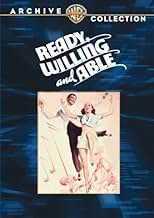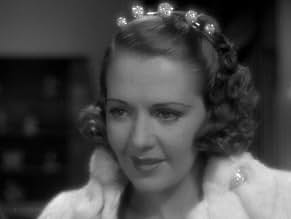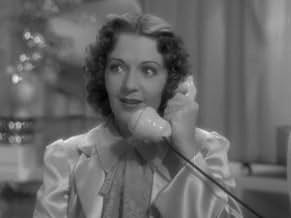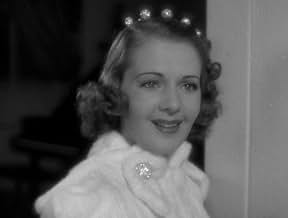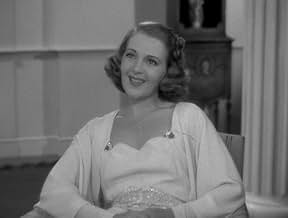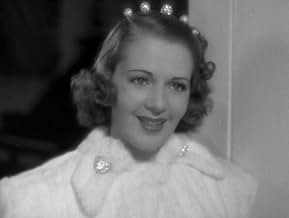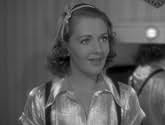Ajouter une intrigue dans votre langueTwo songwriters want to cast a British star in their new show.Two songwriters want to cast a British star in their new show.Two songwriters want to cast a British star in their new show.
- Réalisation
- Scénario
- Casting principal
- Nommé pour 1 Oscar
- 1 nomination au total
Al Shaw
- Moving Man
- (as Shaw)
Sam Lee
- Moving Man
- (as Lee)
Lillian Kemble-Cooper
- Mrs. Buffington (Credits)
- (as Lillian Kemble Cooper)
- …
Avis à la une
READY, WILLING AND ABLE (Warner Brothers, 1937), directed by Ray Enright, is a lightweight backstage story produced in late 1936 that marked the en of an era for Ruby Keeler as the tap dancing darling of Warner Brothers musicals. With Lee Dixon, Allen Jenkins and Louise Fazenda listed below Keeler's name, the main focus is actually on Ross Alexander, billed fifth in the casting credits. Sadly, upon completion of this musical, Alexander had committed suicide in January 1937, leaving one to wonder how far he could have gone in motion pictures, which began for him in 1932, followed by a Warner Brothers studio contract in 1934.
The plot in brief finds Barry Granville (Ross Alexander), a songwriter, actor and producer, who, along with Pinky Blair (Lee Dixon), hoofer and partner, hope to get their show, "Fair Lady" (no, NOT "My Fair Lady") produced on Broadway. McNeil (Addison Richards), an agent from Amalgamated Pictures, agrees to back the show if they can get a well known personality to appear in it. It is suggested they try to get Jane Clarke, an English musical-comedy star currently making headlines. They so happen to locate a Jane Clarke (Ruby Keeler), an aspiring dancer and student of Broadfield College returning home from England with her classmates. After the ship docks New York, she is approached and mistaken for the English singer by J. Van Courtland (Allen Jenkins), a theatrical agent sponsoring Granville. Jane is coaxed by her friend, Angie (Carol Hughes) to sign an immediate contract with Granville, feeling this would be her big opportunity to crash Broadway. Granville, of course, falls in love with his young "English" star, which makes it difficult for the guilt-ridden Jane to get enough courage to tell him the truth about herself. She does continue, however, with her masquerade, British accent and all. The jig is up, however, when the real Jane Clarke (Winifred Shaw) arrives from England after learning that she's to appear in a show she knows nothing about. However, the English Jane Clarke turns out to also be a fraud, which causes further conflict for Barry.
As with the latter MGM musicals that starred Mickey Rooney and Judy Garland in the late 30s/early 1940s, the cast in READY, WILLING AND ABLE is so energetic, especially Alexander and Jenkins, that it's ashame they couldn't rise above a mediocre script. Alexander's singing voice is obviously dubbed and Lee Dixon (who looks more like a movie cowboy than a Broadway hoofer) tap dances like a puppet on a string. An average score by Johnny Mercer and Richard Whiting includes: "The World is My Apple" (sung by Lee Dixon); "Handy With Your Feet" (sung and danced by Keeler); "Just a Quiet Evening" (sung by Alexander/ danced by Keeler and Dixon at dinner party), "Sentimental and Melacholy" (sung by Winifred Shaw); and the hit tune, "Too Marvelous for Words," which is plugged three times during the story, becoming the closing production number in which Keeler and Dixon tap dance on keys to a giant typewriter, compliments of choreographer Bobby Connolly, whose dance direction is usually mediocre at best. This production number was, however, nominated for an Academy Award for best dance direction. Aside from the song and dance, Louise Fazenda and Teddy Hart do a very familiar comedy routine during dress rehearsal, one that better served comedy team of Bud Abbott and Lou Costello in THE NAUGHTY NINETIES (Universal, 1945). Look for it. Featured in the supporting cast are Hugh O'Connell as Keeler's middle-aged but uninteresting fiancé, Truman Hardy; Shaw and Lee as the piano movers who do tap routines; Barnett Parker as a authentic English waiter; and a very young and cute Jane Wyman as a sharp-tongued secretary.
In spite of mistaken identity plot used numerous times in 1930s musicals, the best being GOLD DIGGERS OF 1933, READY, WILLING AND ABLE failed to become a classic. One of the few channels to have aired this musical at one point of time was WPHL, Channel 17, in Philadelphia, prior to 1974. Currently available on Turner Classic Movies, take notice whenever READY, WILLING AND ABLE is preceded by a three minute theatrical trailer that most of the major leads and their scenes are described and highlighted with the exception of Ross Alexander. His dubbed singing is heard, but is never seen.
On a personal level, the chemistry between Keeler and Alexander fails to register that certain spark and charisma Keeler made opposite Dick Powell in those seven musicals, and once opposite her overgrown husband Al Jolson. If remembered at all, READY, WILLING AND ABLE would be noted for its introduction to the popular tune of "Too Marvelous For Words." (**1/2)
The plot in brief finds Barry Granville (Ross Alexander), a songwriter, actor and producer, who, along with Pinky Blair (Lee Dixon), hoofer and partner, hope to get their show, "Fair Lady" (no, NOT "My Fair Lady") produced on Broadway. McNeil (Addison Richards), an agent from Amalgamated Pictures, agrees to back the show if they can get a well known personality to appear in it. It is suggested they try to get Jane Clarke, an English musical-comedy star currently making headlines. They so happen to locate a Jane Clarke (Ruby Keeler), an aspiring dancer and student of Broadfield College returning home from England with her classmates. After the ship docks New York, she is approached and mistaken for the English singer by J. Van Courtland (Allen Jenkins), a theatrical agent sponsoring Granville. Jane is coaxed by her friend, Angie (Carol Hughes) to sign an immediate contract with Granville, feeling this would be her big opportunity to crash Broadway. Granville, of course, falls in love with his young "English" star, which makes it difficult for the guilt-ridden Jane to get enough courage to tell him the truth about herself. She does continue, however, with her masquerade, British accent and all. The jig is up, however, when the real Jane Clarke (Winifred Shaw) arrives from England after learning that she's to appear in a show she knows nothing about. However, the English Jane Clarke turns out to also be a fraud, which causes further conflict for Barry.
As with the latter MGM musicals that starred Mickey Rooney and Judy Garland in the late 30s/early 1940s, the cast in READY, WILLING AND ABLE is so energetic, especially Alexander and Jenkins, that it's ashame they couldn't rise above a mediocre script. Alexander's singing voice is obviously dubbed and Lee Dixon (who looks more like a movie cowboy than a Broadway hoofer) tap dances like a puppet on a string. An average score by Johnny Mercer and Richard Whiting includes: "The World is My Apple" (sung by Lee Dixon); "Handy With Your Feet" (sung and danced by Keeler); "Just a Quiet Evening" (sung by Alexander/ danced by Keeler and Dixon at dinner party), "Sentimental and Melacholy" (sung by Winifred Shaw); and the hit tune, "Too Marvelous for Words," which is plugged three times during the story, becoming the closing production number in which Keeler and Dixon tap dance on keys to a giant typewriter, compliments of choreographer Bobby Connolly, whose dance direction is usually mediocre at best. This production number was, however, nominated for an Academy Award for best dance direction. Aside from the song and dance, Louise Fazenda and Teddy Hart do a very familiar comedy routine during dress rehearsal, one that better served comedy team of Bud Abbott and Lou Costello in THE NAUGHTY NINETIES (Universal, 1945). Look for it. Featured in the supporting cast are Hugh O'Connell as Keeler's middle-aged but uninteresting fiancé, Truman Hardy; Shaw and Lee as the piano movers who do tap routines; Barnett Parker as a authentic English waiter; and a very young and cute Jane Wyman as a sharp-tongued secretary.
In spite of mistaken identity plot used numerous times in 1930s musicals, the best being GOLD DIGGERS OF 1933, READY, WILLING AND ABLE failed to become a classic. One of the few channels to have aired this musical at one point of time was WPHL, Channel 17, in Philadelphia, prior to 1974. Currently available on Turner Classic Movies, take notice whenever READY, WILLING AND ABLE is preceded by a three minute theatrical trailer that most of the major leads and their scenes are described and highlighted with the exception of Ross Alexander. His dubbed singing is heard, but is never seen.
On a personal level, the chemistry between Keeler and Alexander fails to register that certain spark and charisma Keeler made opposite Dick Powell in those seven musicals, and once opposite her overgrown husband Al Jolson. If remembered at all, READY, WILLING AND ABLE would be noted for its introduction to the popular tune of "Too Marvelous For Words." (**1/2)
Mistaken for a famous British singing star, an American college girl decides she's READY, WILLING AND ABLE to conquer Broadway - especially after meeting the young scriptwriter who's producing the play...
A fine example of the musical comedies which Warner Brothers seemed to produce so effortlessly during the 1930's, it's a shame this film has become so obscure. With good production values & a snappy storyline, it's still a pleasant entertainment. The major missing component is Busby Berkeley; the final production number, with Ruby Keeler & dancer Lee Dixon hoofing it upon the keys of a giant typewriter, fairly cries for the Master to send it over the top.
Pert & pretty, Miss Keeler is, as always, much fun to watch. Many of her scenes are given the added attractions of the lovely Carol Hughes, playing her best friend. Wini Shaw, as a singer with too much past & tart-tongued secretary Jane Wyman also contribute to the fun.
The comedy relief is largely handled by Allen Jenkins as a loudmouthed agent, Louise Fazenda as a faded Shakespearean actress & Hugh O'Connell as a society fuddy-duddy. Comic cameos by E. E. Clive & Lillian Kemble-Cooper as an English knight & lady, and Barnett Parker as a helpful British butler, are also welcome. Movie mavens will spot an unbilled Carlyle Moore Jr. as a dockside reporter.
Ultimately, though, there is sadness attached to this film. The leading man, Ross Alexander, shot himself before the film could be released. This was his final film; he was only 29. Born Ross Smith in Brooklyn in 1907, Alexander had the personality, talent & good looks which should have spelled significant stardom. But Hollywood is notoriously unpredictable, and Alexander, unhappy with the way his career was going & obviously still troubled by the gunshot suicide of his first wife in December of 1935, placed a pistol to his own head on January 2, 1937.
Once dead, it was Warner Brothers that paid him the final indignity. Having a completed film with a star who was not only deceased, but a suicide as well, was a bit more than the Studio wanted to deal with. So, cutting their losses, they gave Ross Alexander fifth place billing on the lineup of performers for READY, WILLING AND ABLE, where he should have received first or second.
Outside of his appearance in A MIDSUMMER NIGHT'S DREAM (1935), he is almost forgotten now. Ross Alexander was a victim of the Hollywood system and his own private anguish, each of which fed on the other. He should be remembered as a fine young actor, who, in a very few years, brought lots of enjoyment to movie audiences. This is typified by his best scene in READY, WILLING AND ABLE, where he introduces the Johnny Mercer lyrics for 'Too Marvelous For Words,' by gently reciting them to Ruby Keeler. It is a tremendously poignant few moments.
A fine example of the musical comedies which Warner Brothers seemed to produce so effortlessly during the 1930's, it's a shame this film has become so obscure. With good production values & a snappy storyline, it's still a pleasant entertainment. The major missing component is Busby Berkeley; the final production number, with Ruby Keeler & dancer Lee Dixon hoofing it upon the keys of a giant typewriter, fairly cries for the Master to send it over the top.
Pert & pretty, Miss Keeler is, as always, much fun to watch. Many of her scenes are given the added attractions of the lovely Carol Hughes, playing her best friend. Wini Shaw, as a singer with too much past & tart-tongued secretary Jane Wyman also contribute to the fun.
The comedy relief is largely handled by Allen Jenkins as a loudmouthed agent, Louise Fazenda as a faded Shakespearean actress & Hugh O'Connell as a society fuddy-duddy. Comic cameos by E. E. Clive & Lillian Kemble-Cooper as an English knight & lady, and Barnett Parker as a helpful British butler, are also welcome. Movie mavens will spot an unbilled Carlyle Moore Jr. as a dockside reporter.
Ultimately, though, there is sadness attached to this film. The leading man, Ross Alexander, shot himself before the film could be released. This was his final film; he was only 29. Born Ross Smith in Brooklyn in 1907, Alexander had the personality, talent & good looks which should have spelled significant stardom. But Hollywood is notoriously unpredictable, and Alexander, unhappy with the way his career was going & obviously still troubled by the gunshot suicide of his first wife in December of 1935, placed a pistol to his own head on January 2, 1937.
Once dead, it was Warner Brothers that paid him the final indignity. Having a completed film with a star who was not only deceased, but a suicide as well, was a bit more than the Studio wanted to deal with. So, cutting their losses, they gave Ross Alexander fifth place billing on the lineup of performers for READY, WILLING AND ABLE, where he should have received first or second.
Outside of his appearance in A MIDSUMMER NIGHT'S DREAM (1935), he is almost forgotten now. Ross Alexander was a victim of the Hollywood system and his own private anguish, each of which fed on the other. He should be remembered as a fine young actor, who, in a very few years, brought lots of enjoyment to movie audiences. This is typified by his best scene in READY, WILLING AND ABLE, where he introduces the Johnny Mercer lyrics for 'Too Marvelous For Words,' by gently reciting them to Ruby Keeler. It is a tremendously poignant few moments.
Lee Dixon and Ross Alexander are minor actors in the history of Hollywood and here they both star as two struggling guys trying to peddle their musical show. But when you read their back story on IMDb, they are a very sad couple of guys. Before this film even debuted, Alexander (Barry) was dead from a self-inflicted gunshot wound (he was 29)! And, less than a decade later, Dixon (Pinky) would be dead...a guy who drank himself to death at age 42! Talk about tragic! Fortunately, their co-star, Ruby Keeler, had a much happier life!
When the film begins, Pinky and Barry are both struggling to market their new show. Fortunately, they just found a backer--and in order to get this backing they need to sign a British actress. When they go to meet her, the duo make a mistake and accidentally hire an unknown chorus girl (Ruby Keeler) with the same name. She's excited about the opportunity and so she keeps quiet and just accepts the offer. Unfortunately, when folks learn the truth, the show closes. What's next? See the film.
What follows at the end of the movie are a whole bunch of production numbers. Some are a bit dull, though the typewriter sequence is pretty amazing to watch. Overall, a passable bit of entertainment...but not much more. The songs aren't all that memorable and the plot is slight to say the least. The film could have used a bit more comedy to lighten the mood.
When the film begins, Pinky and Barry are both struggling to market their new show. Fortunately, they just found a backer--and in order to get this backing they need to sign a British actress. When they go to meet her, the duo make a mistake and accidentally hire an unknown chorus girl (Ruby Keeler) with the same name. She's excited about the opportunity and so she keeps quiet and just accepts the offer. Unfortunately, when folks learn the truth, the show closes. What's next? See the film.
What follows at the end of the movie are a whole bunch of production numbers. Some are a bit dull, though the typewriter sequence is pretty amazing to watch. Overall, a passable bit of entertainment...but not much more. The songs aren't all that memorable and the plot is slight to say the least. The film could have used a bit more comedy to lighten the mood.
Lee Dixon and Ross Alexander, struggling songwriters, are dancing in their boxers because the tailor has their pants. The tailor wants fifty cents for his work, but they haven't four bits between them and so must resort to musical distractions. "Every time I come up here," the tailor complains, "you sing me out of your pants."
Meanwhile, shipboard, Ruby Keeler and a bunch of other "college girls" put on a show for their fellow ocean liner passengers. They're amateurs—but this is a Warner Bros. musical, so the show is big and polished. Ruby does a great song and dance; she would love to be a real Broadway star, but she knows that could never happen .
Music and high spirits abound in this lively musical about getting one's big break. Keeler, of course, gets her shot at the big time, as do Dixon and Alexander. And of course there is a major complication.
Allen Jenkins is at his best as a failed stage actor who, having tried everything else, becomes an "agent" and thinks he sees his big chance when he overhears a telegram being phoned in, sending to England for a big star.
Louise Fazenda is very funny as Ruby's teacher or chaperone, who admits that she herself once had aspirations as an actress—and then spends most of the movie reciting jumbled bits of Shakespeare. She holds her purse like a skull: "Alas, poor Yorick," she intones, "I knew him intimately." (At which Allen Jenkins gives her a funny look: "What's your friend doing now?")
Ross Alexander, as the songwriter, has the privilege of speaking and then singing the film's great song, "Too Marvelous for Words." Keeler's most memorable dance is the finale, in which she and Dixon dance from key to key on a giant typewriter.
Somewhat oddly, Keeler doesn't really sing and Alexander doesn't dance, and so the leading couple don't do any true duets—Alexander sings to Ruby instead of with her, and Dixon fills in as dancing partner.
Overall, it's no classic but still very entertaining—especially for fans of Ruby Keeler's wonderful dancing.
Meanwhile, shipboard, Ruby Keeler and a bunch of other "college girls" put on a show for their fellow ocean liner passengers. They're amateurs—but this is a Warner Bros. musical, so the show is big and polished. Ruby does a great song and dance; she would love to be a real Broadway star, but she knows that could never happen .
Music and high spirits abound in this lively musical about getting one's big break. Keeler, of course, gets her shot at the big time, as do Dixon and Alexander. And of course there is a major complication.
Allen Jenkins is at his best as a failed stage actor who, having tried everything else, becomes an "agent" and thinks he sees his big chance when he overhears a telegram being phoned in, sending to England for a big star.
Louise Fazenda is very funny as Ruby's teacher or chaperone, who admits that she herself once had aspirations as an actress—and then spends most of the movie reciting jumbled bits of Shakespeare. She holds her purse like a skull: "Alas, poor Yorick," she intones, "I knew him intimately." (At which Allen Jenkins gives her a funny look: "What's your friend doing now?")
Ross Alexander, as the songwriter, has the privilege of speaking and then singing the film's great song, "Too Marvelous for Words." Keeler's most memorable dance is the finale, in which she and Dixon dance from key to key on a giant typewriter.
Somewhat oddly, Keeler doesn't really sing and Alexander doesn't dance, and so the leading couple don't do any true duets—Alexander sings to Ruby instead of with her, and Dixon fills in as dancing partner.
Overall, it's no classic but still very entertaining—especially for fans of Ruby Keeler's wonderful dancing.
As people have already noted, 'Ready, Willing and Able' is notable for being Ross Alexander's swansong before his tragic suicide and Ruby Keeler's last film for Warner Bros, but they certainly aren't the only notable factors of the film.
'Ready, Willing and Able' is not a great film, but it does have enough to make it watchable. Keeler is a very charming screen presence, and Alexander a likable leading man. Most of the supporting cast also fare well, with the hoots that are Allen Jenkins and Louisa Fazenda faring best. Wini Shaw is also very winning, as is Jane Wyman.
Of the song score, only one is really outstanding. That is the sublime "Too Marvellous for Words", though "Be Handy on Your Feet" is also catchy and "Just a Quiet Evening" very listenable. Don't remember much of the rest though. The classical music selections of Schumann, Chopin and Liszt are also a delight.
The film looks pretty good, apart from the odd tacky moment, it is very skilfully photographed and while not exactly expansive the set is generally a long way from cheap.
Conversely, to me Lee Dixon was wooden in acting and even more so in his dancing, which doesn't look natural or rhythmic at all. There is a lack of chemistry between Keeler and Dixon, though occasionally a sweet one with Alexander, just that one does miss Dick Powell (who one can't help thinking that he would have been a better choice). The story, even for a film musical, is overly simplistic, goes overboard with the silliness and dumbness and is as thin as thin ice.
Even flimsier is the hugely underwritten and dull script, that's far too lightweight. Of the choreography and dancing, the only one that stands out is the clever type-writing sequence. The others are pedestrian and under-cooked, am aware that one shouldn't expect Busby Bekeley to be involved in every film musical around this time but the songs generally did deserve better treatment than the indifference they were given here, this was a film that cried out for his involvement really.
All in all, watchable but not great. 5/10 Bethany Cox
'Ready, Willing and Able' is not a great film, but it does have enough to make it watchable. Keeler is a very charming screen presence, and Alexander a likable leading man. Most of the supporting cast also fare well, with the hoots that are Allen Jenkins and Louisa Fazenda faring best. Wini Shaw is also very winning, as is Jane Wyman.
Of the song score, only one is really outstanding. That is the sublime "Too Marvellous for Words", though "Be Handy on Your Feet" is also catchy and "Just a Quiet Evening" very listenable. Don't remember much of the rest though. The classical music selections of Schumann, Chopin and Liszt are also a delight.
The film looks pretty good, apart from the odd tacky moment, it is very skilfully photographed and while not exactly expansive the set is generally a long way from cheap.
Conversely, to me Lee Dixon was wooden in acting and even more so in his dancing, which doesn't look natural or rhythmic at all. There is a lack of chemistry between Keeler and Dixon, though occasionally a sweet one with Alexander, just that one does miss Dick Powell (who one can't help thinking that he would have been a better choice). The story, even for a film musical, is overly simplistic, goes overboard with the silliness and dumbness and is as thin as thin ice.
Even flimsier is the hugely underwritten and dull script, that's far too lightweight. Of the choreography and dancing, the only one that stands out is the clever type-writing sequence. The others are pedestrian and under-cooked, am aware that one shouldn't expect Busby Bekeley to be involved in every film musical around this time but the songs generally did deserve better treatment than the indifference they were given here, this was a film that cried out for his involvement really.
All in all, watchable but not great. 5/10 Bethany Cox
Le saviez-vous
- AnecdotesFinal film of Ross Alexander. NOTE: He committed suicide two months before this film was released. Because of this event, Warners eliminated his name from the above title credits, substituted that of Lee Dixon--who actually had little more to do than to serve as Ruby Keeler's dancing partner in an otherwise subordinate role--and relegated Alexander's credit to that of a member of the supporting cast, even though he played the leading male role, and Keeler's romantic lead. Reportedly, James Newill dubbed Alexander's singing voice.
- GaffesWhen Ruby Keeler decides to ask Hugh O'Connell to pay the balance due on the show so it can open as scheduled, Hugh's jacket is closed in the wrong direction. Since his handkerchief is visibly on the correct side, it's not flipped film.
- Citations
Pinky Blair: Hiya, baby! Hey, did you hear my last song?
Dot: I hope so!
Pinky Blair: Dot, what do you think I am now?
Dot: Well, a man who had been valet to a seal could be anything!
Pinky Blair: You guessed it. He's an actors' agent.
Dot: An agent? You have hit a new low!
- ConnexionsReferenced in The Honeymooners: The $99,000 Answer (1956)
- Bandes originalesToo Marvelous for Words
(1937) (uncredited)
Music by Richard A. Whiting
Lyrics by Johnny Mercer
Played during the opening and end credits and as background music
Played on piano by Lee Dixon and spoken by Ross Alexander
Reprised on piano by Lee Dixon at a party
Sung by Ross Alexander at a party
Was the show's big production number at its opening, sung by Ross Alexander (dubbed by James Newill) and Wini Shaw and chorus,
and danced to by Ruby Keeler, Lee Dixon and chorus
Meilleurs choix
Connectez-vous pour évaluer et suivre la liste de favoris afin de recevoir des recommandations personnalisées
Détails
- Date de sortie
- Pays d’origine
- Langue
- Aussi connu sous le nom de
- Amores de Opereta
- Lieux de tournage
- Société de production
- Voir plus de crédits d'entreprise sur IMDbPro
- Durée1 heure 33 minutes
- Couleur
- Mixage
- Rapport de forme
- 1.37 : 1
Contribuer à cette page
Suggérer une modification ou ajouter du contenu manquant

Lacune principale
By what name was Ready, Willing and Able (1937) officially released in India in English?
Répondre
